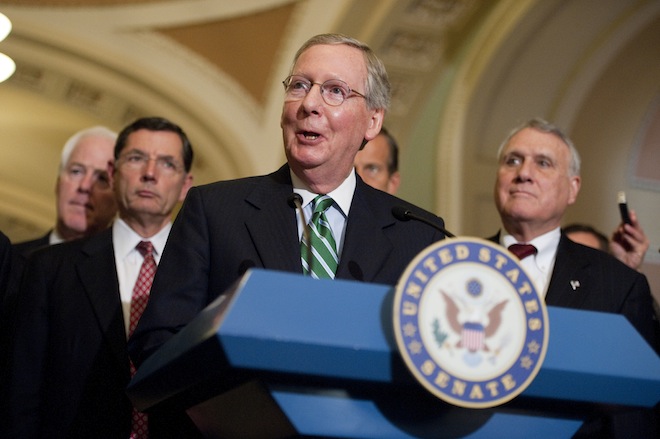The Senate went back to the future on Tuesday.
Republicans unanimously filibustered Democratic-led legislation aimed at closing the pay gap between women and men. The measure would beef up protections for women who sue employers for gender-based wage discrimination or discuss pay with their co-workers — and the GOP blocked it just as it did in late 2010 when the Paycheck Fairness Act last came up.
The cloture motion went down 52-47 — short of the 60 votes needed to proceed.
“We already have on the books the Equal Pay Act, the Civil Rights Act and the Lilly Ledbetter Act, which I did support,” Sen. Susan Collins (R-ME) told a few reporters in the Capitol. “And I believe that they provide adequate protections. I think this bill would result in excessive litigation that would impose a real burden, particularly on small businesses. So I think existing laws are adequate.”
For Democrats, the vote was a golden opportunity to strengthen their advantage with women voters ahead of the election. Senate Majority Leader Harry Reid (D-NV) and the bill’s sponsor Sen. Barbara Mikulski (D-MD) invited Lilly Ledbetter, the face of the 2009 law, to the Capitol to make the case for the new legislation.
“I’m telling you folks, this is a national epidemic in this country,” Ledbetter said of unequal pay. Flanked by Reid and Mikulski, she criticized Republican presidential nominee Mitt Romney for refraining from taking a stance on the bill. “He’s scaring me to death,” she said. “We cannot let [Republicans] take away the few privileges we’re earned.”
“Women are mad as hell and don’t want to take it anymore,” said Mikulski.
President Obama and Democrats made a concerted case for the bill in three separate conference calls Monday. They have frequently cited the statistic that women earn 77 cents for every dollar men make for equal work — although data suggests the gap is smaller when factoring in career choices and time taken off to raise children.
“The pay gap is troubling if it is attributable to discrimination,” said Collins, a moderate Republican. “In other cases it may be due to personal decisions that women make to leave the workforce to raise children for a number of years and then to return to the workforce, for example. So I don’t think you can assume discrimination.”
Republicans, seeking to mitigate the fallout after recent debates over women’s health have cast them in a harsh light among female voters, were careful not to be seen as rooting against the cause of equal pay. Instead, they decried the bill as a political stunt.
“It’s pure election-year politics,” said Sen. Marco Rubio (R-FL). “This bill reads more to me like some sort of a welfare plan for trial lawyers.”
After the vote, Mikulski said, “We’re not going to give up. … But it’s a sad day.”






